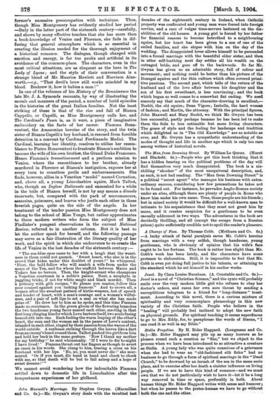decades of the eighteenth century in Ireland, when Catholic property
was confiscated and young men were forced into foreign service, and a race of vulgar time-servers battened on the dis- abilities of the old houses. A young girl is forced by her father for financial reasons to become betrothed to a neighbouring squire, but her heart has been given to a son of one of the exiled families, and she elopes with him on the day of the wedding. The disappointed lover allows himself to be persuaded into a forced marriage with the beautiful elder sister, and then in utter self-loathing next day settles all his wealth on the outraged bride, and goes off to the backwoods. So far Mr. Gwynn has given us an admirable story, full of colour and movement ; and nothing could be better than his picture of the Donegal squires and the thin culture which often covered primi- tive passions. The second part, which tells of the return of the husband and of the love affair between his daughter and the son of his first sweetheart, is less convincing ; and the book which began so well comes to a somewhat flat ending. We need scarcely say that much of the character-drawing is excellent,— Nesbit, the old squire; Dean Vigors ; Isabella, the hard woman of fashion; and Martin, the attorney. With the principal figures, John Maxwell and Mary Nesbit, we think Mr. Gwynn has been less successful, partly perhaps because he has been led to make them the foils to less estimable but more living characters. The grace of style and the feeling for landscape and tradition which delighted us in "The Old Knowledge" are as notable as ever, and Mr. Gwynn has a sympathetic understanding of the modes of thought and life in another age which is only too rare among writers of historical novels.










































 Previous page
Previous page